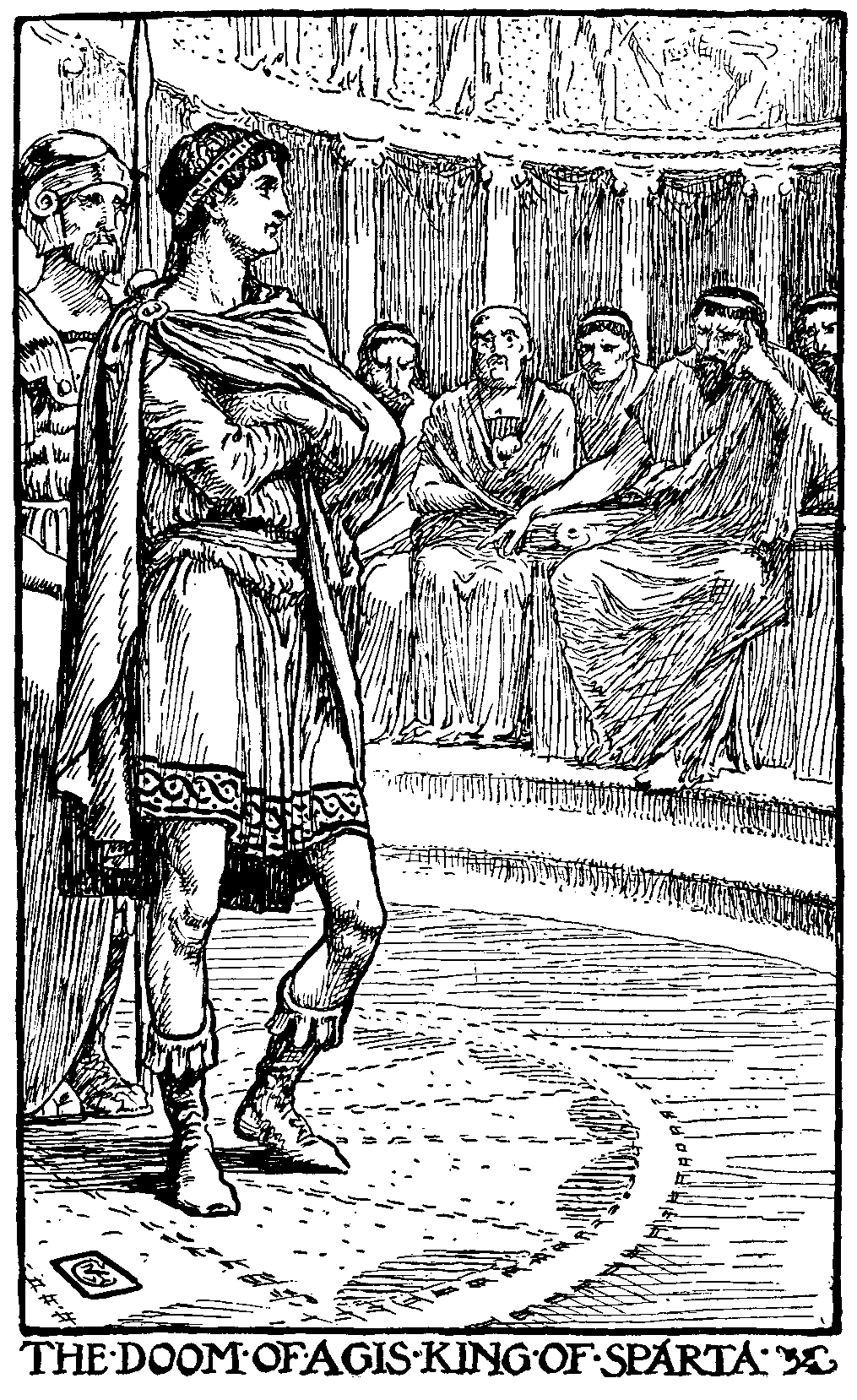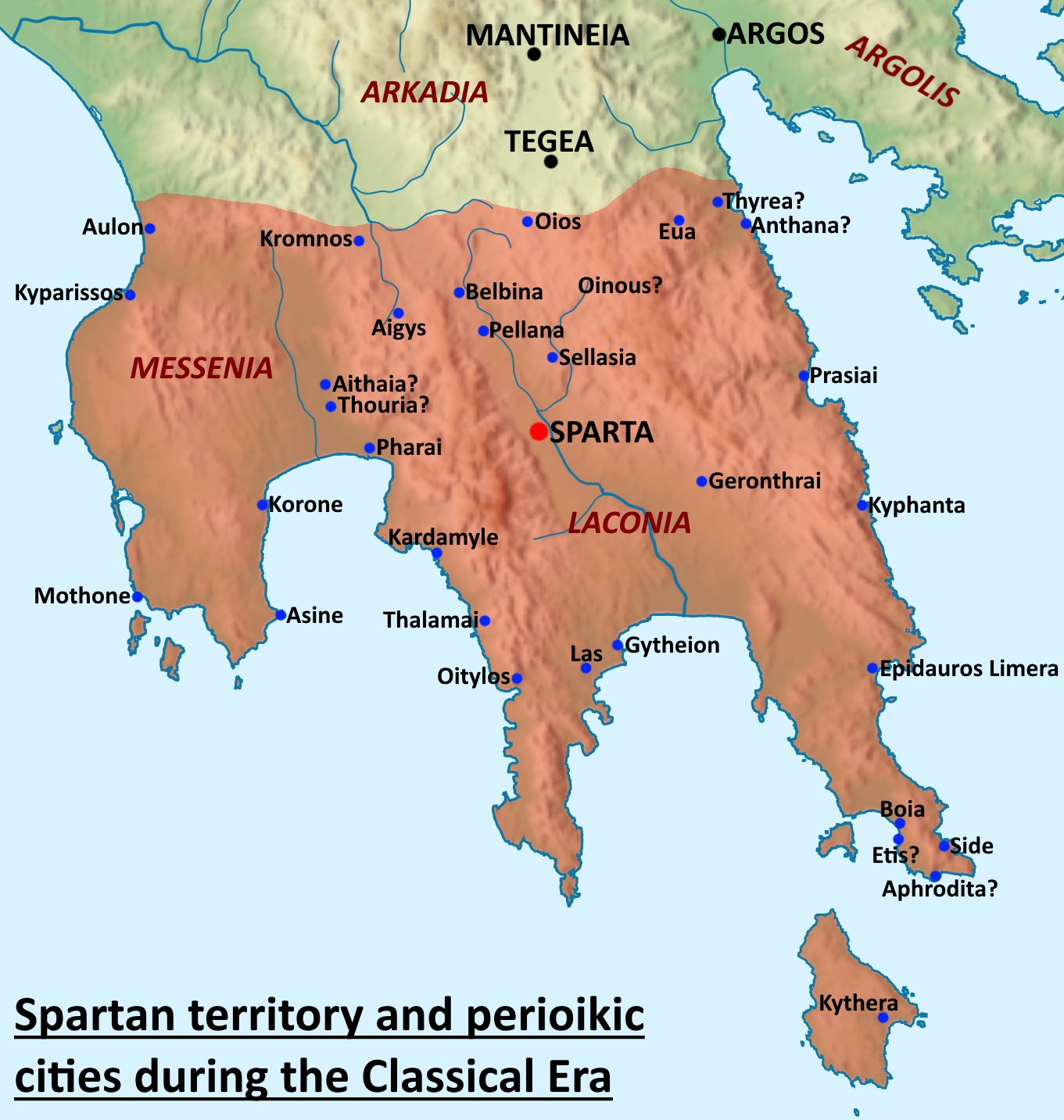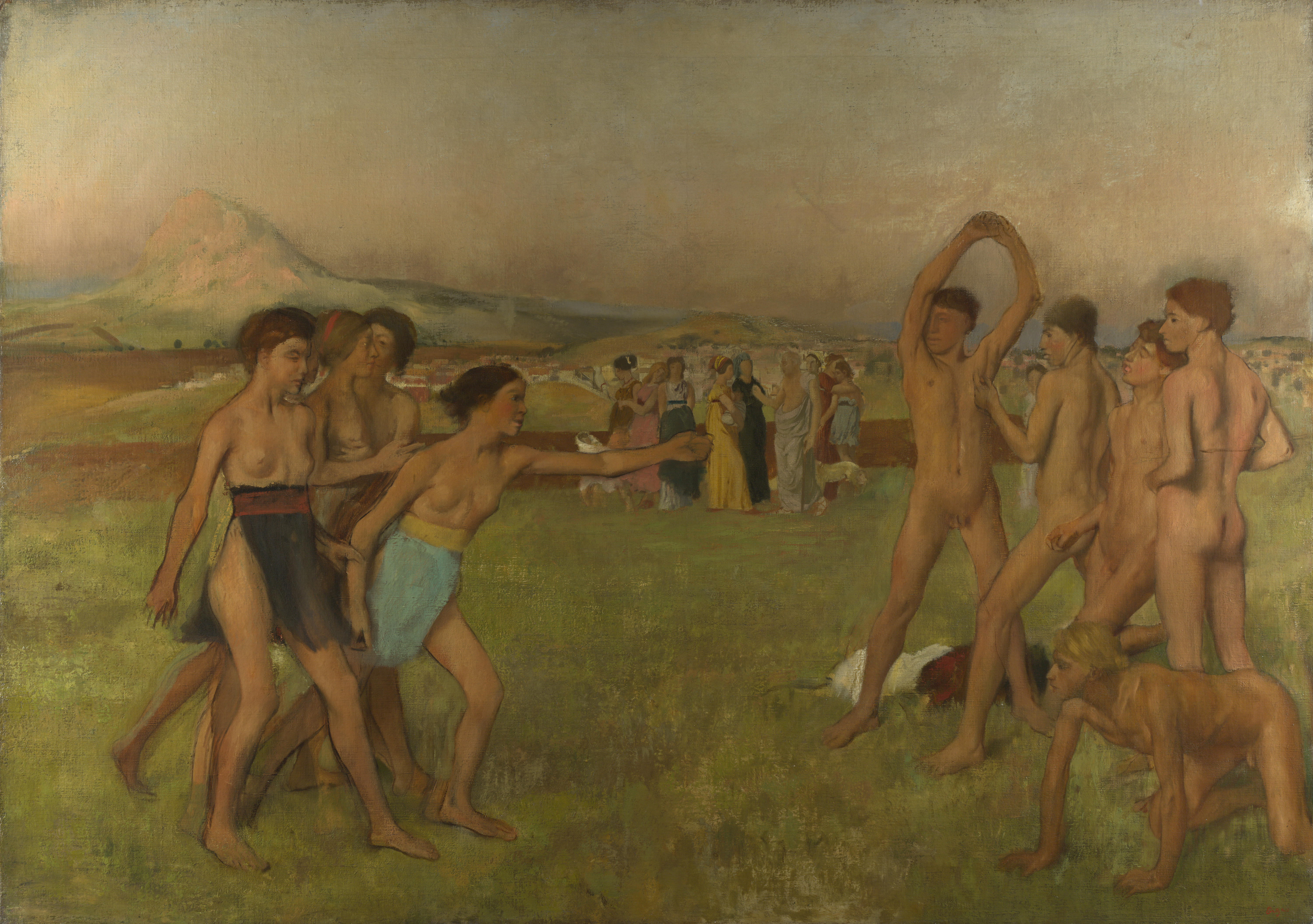|
Agis IV
Agis IV ( grc-gre, Ἄγις; c. 265 BC – 241 BC), the elder son of Eudamidas II, was the 25th king of the Eurypontid dynasty of Sparta. Posterity has reckoned him an idealistic but impractical monarch. Family background and accession Agis was the son of Eudamidas II () and grandson of Archidamus IV (), who belonged to the Eurypontid dynasty, one of the two royal families of Sparta (the other being the Agiads). The reign of Agis marks a re-emergence of the Eurypontids, who had disappeared from the records since the defeat of Archidamus IV against Demetrios Polyorketes in 294. His father is indeed the most obscure of all the Spartan kings, perhaps due to a mental or physical disability. Eudamidas II's dates of reign are therefore very conjectural. The traditional year of his death is c.245, but he may have died earlier (up to 263), in which case a regent was appointed during Agis' minority, as he was born c.265. The most likely candidate is his uncle Agesilaus, who played a ... [...More Info...] [...Related Items...] OR: [Wikipedia] [Google] [Baidu] |
Eudamidas II
Eudamidus II ( grc-gre, Εὐδαμίδας) was the 24th King of Sparta of the Eurypontid dynasty. He was the son of King Archidamus IV, nephew of Agesistrata and grandson of Eudamidas I and Archidamia. He ruled from 275 BC to 244 BC. Two of his sons, his successor Agis IV and Archidamus V Archidamus V ( grc, Ἀρχίδαμος Ε΄) was the 27th of the Kings of Sparta of the Eurypontid line, reigning during 228 and 227 BC. He was the son of Eudamidas II and Agesistrata and through him the grandson of Archidamus IV, after whom he w ..., went on to become Eurypontid kings of Sparta. 3rd-century BC rulers 3rd-century BC Spartans Eurypontid kings of Sparta 240s BC deaths Year of birth unknown {{AncientGreece-bio-stub ... [...More Info...] [...Related Items...] OR: [Wikipedia] [Google] [Baidu] |
Archidamus V
Archidamus V ( grc, Ἀρχίδαμος Ε΄) was the 27th of the Kings of Sparta of the Eurypontid line, reigning during 228 and 227 BC. He was the son of Eudamidas II and Agesistrata and through him the grandson of Archidamus IV, after whom he was named. After his brother Agis IV was murdered in 241 BC, he fled to Messenia. In 228 (or 227) he was ordered back to Sparta by King Cleomenes III of the Agiad line, who had no counterpart on the throne by then, after the death of Eudamidas III Eudamidas III ( grc-gre, Εὐδαμίδας; reigned from 241 to 228 BC), son of Agis IV and Agiatis, daughter of Gylippus, was king of Sparta and a member of the Eurypontid dynasty. When his father was murdered he had just been born. Due to his ..., the son of Agis IV. He was assassinated shortly afterwards. Polybius claims that he was killed by Cleomenes. References {{DEFAULTSORT:Archidamus 05 3rd-century BC rulers 3rd-century BC Spartans Eurypontid kings of Sparta 220s BC de ... [...More Info...] [...Related Items...] OR: [Wikipedia] [Google] [Baidu] |
Ephor
The ephors were a board of five magistrates in ancient Sparta. They had an extensive range of judicial, religious, legislative, and military powers, and could shape Sparta's home and foreign affairs. The word "''ephors''" (Ancient Greek ''éphoroi'', plural form of ''éphoros'') comes from the Ancient Greek ''epi'', "on" or "over", and ''horaō'', "to see", i.e., "one who oversees" or "overseer". The ephors were a council of five Spartan men elected annually who swore an oath monthly on the behalf of the state. The Spartan kings, however, would swear on behalf of themselves. The ephors did not have to kneel before the Kings of Sparta, and were held in high esteem by the citizens because of the importance of their powers and because of the holy role that they earned throughout their functions.Donald Kagan, ''The Outbreak of the Peloponnesian War''. page 29. Ithaca/New York 1969, . Several other Greek city-states with a Spartan ancestry also had ephors, such as Taras or Cy ... [...More Info...] [...Related Items...] OR: [Wikipedia] [Google] [Baidu] |
Mandrocleides
Mandrocleides was an influential follower of Agis IV of Sparta's reforms re-establishing the institutions of Lycurgus Lycurgus or Lykourgos () may refer to: People * Lycurgus (king of Sparta) (third century BC) * Lycurgus (lawgiver) (eighth century BC), creator of constitution of Sparta * Lycurgus of Athens (fourth century BC), one of the 'ten notable orators' ... in the 3rd century BC. 3rd-century BC Spartans {{AncientGreece-bio-stub ... [...More Info...] [...Related Items...] OR: [Wikipedia] [Google] [Baidu] |
Battle Of Aegospotami
The Battle of Aegospotami was a naval confrontation that took place in 405 BC and was the last major battle of the Peloponnesian War. In the battle, a Spartan fleet under Lysander destroyed the Athenian navy. This effectively ended the war, since Athens could not import grain or communicate with its empire without control of the sea. Prelude Lysander's campaigns In 405 BC, following the severe Spartan defeat at the Battle of Arginusae, Lysander, the commander who had been responsible for the first Spartan naval successes, was reinstated in command. Since the Spartan constitution prohibited any commander from holding the office of navarch more than once, he was appointed as a vice-admiral instead, with the clear understanding that this was a mere legal fiction. One of Lysander's advantages as a commander was his close relationship with the Persian prince Cyrus. Using this connection, he quickly raised the money to begin rebuilding the Spartan fleet. When Cyrus was recalled to Sus ... [...More Info...] [...Related Items...] OR: [Wikipedia] [Google] [Baidu] |
Lysander
Lysander (; grc-gre, Λύσανδρος ; died 395 BC) was a Spartan military and political leader. He destroyed the Athenian fleet at the Battle of Aegospotami in 405 BC, forcing Athens to capitulate and bringing the Peloponnesian War to an end. He then played a key role in Sparta's domination of Greece for the next decade until his death at the Battle of Haliartus. Lysander's vision for Sparta differed from most Spartans; he wanted to overthrow the Athenian Empire and replace it with Spartan hegemony. Early life Little is known of Lysander's early life. His year of birth is estimated at 454 BC. Some ancient authors record that his mother was a helot or slave. Lysander's father was Aristocritus, who was a member of the Spartan Heracleidae; that is, he claimed descent from Heracles but was not a member of a royal family. According to Plutarch, Lysander grew up in poverty and showed himself obedient, conformed to norms, and had a "manly spirit".Plutarch, Lives. Life of Lysander. ... [...More Info...] [...Related Items...] OR: [Wikipedia] [Google] [Baidu] |
Perioikoi
The Perioeci or Perioikoi (, ) were the second-tier citizens of the ''polis'' of Sparta until 200 BC. They lived in several dozen cities within Spartan territories (mostly Laconia and Messenia), which were dependent on Sparta. The ''perioeci'' only had political rights in their own city, while the course of the Spartan state exclusively belonged to Spartan citizens, or Spartiates. The name ''perioeci'' roughly means "those dwelling around/nearby", deriving from , ''peri'', "around", and , ''oîkos'', "dwelling, house". ''Perioeci'' and Spartans were collectively called the ''Lakedaimonians''. They had a central role in the Spartan economy, controlling commerce and business, as well as being responsible for crafts and manufacturing, including producing the weapons and armour of the Spartan army, as the higher-ranking Spartan citizens considered all commercial and money-making activities to be unworthy of them. The ''perioeci'' were also the only people allowed to freely travel ... [...More Info...] [...Related Items...] OR: [Wikipedia] [Google] [Baidu] |
Lycurgus Of Sparta
Lycurgus (; grc-gre, Λυκοῦργος ; 820 BC) was the quasi-legendary lawgiver of Sparta who established the military-oriented reformation of Spartan society in accordance with the Oracle of Apollo at Delphi. All his reforms promoted the three Spartan virtues: equality (among citizens), military fitness, and austerity.Forrest, W.G. ''A History of Sparta 950–192 B.C.'' Norton. New York. (1963) p. 50 He is referred to by ancient historians and philosophers Herodotus, Xenophon, Plato, Polybius, Plutarch, and Epictetus. It is not clear if Lycurgus was an actual historical figure; however, many ancient historians believed that he instituted the communalistic and militaristic reforms – most notably the Great Rhetra – which transformed Spartan society. Biography Early life Most information about Lycurgus comes from Plutarch's "Life of Lycurgus" (part of ''Parallel Lives''), which is more of an anecdotal collection than a real biography. Plutarch himself remarks th ... [...More Info...] [...Related Items...] OR: [Wikipedia] [Google] [Baidu] |
Agoge
The ( grc-gre, ἀγωγή in Attic Greek, or , in Doric Greek) was the rigorous education and training program mandated for all male Spartan citizens, with the exception of the firstborn son in the ruling houses, Eurypontid and Agiad. The word had various meanings in Ancient Greek, and comes from the verb (to lead).. There is no evidence that it was used to refer to the Spartan education system until the 3rd century BC, but it was often used before then to mean training, guidance, or discipline. The education featured in the involved cultivating loyalty to Sparta through military training (e.g., pain tolerance), hunting, dancing, singing, and social (communicating) preparation. The was divided into three age groups, roughly corresponding to young children, adolescents, and young adults. Spartan girls did not participate in the , although they may have received a similar state-sponsored education. Sources are unclear about the exact origins of the . According to Xenophon, ... [...More Info...] [...Related Items...] OR: [Wikipedia] [Google] [Baidu] |
Perioeci
The Perioeci or Perioikoi (, ) were the second-tier citizens of the ''polis'' of Sparta until 200 BC. They lived in several dozen cities within Spartan territories (mostly Laconia and Messenia), which were dependent on Sparta. The ''perioeci'' only had political rights in their own city, while the course of the Spartan state exclusively belonged to Spartan citizens, or Spartiates. The name ''perioeci'' roughly means "those dwelling around/nearby", deriving from , ''peri'', "around", and , ''oîkos'', "dwelling, house". ''Perioeci'' and Spartans were collectively called the ''Lakedaimonians''. They had a central role in the Spartan economy, controlling commerce and business, as well as being responsible for crafts and manufacturing, including producing the weapons and armour of the Spartan army, as the higher-ranking Spartan citizens considered all commercial and money-making activities to be unworthy of them. The ''perioeci'' were also the only people allowed to freely travel ... [...More Info...] [...Related Items...] OR: [Wikipedia] [Google] [Baidu] |
Syssitia
The syssitia ( grc, συσσίτια ''syssítia'', plural of ''syssítion'') were, in ancient Greece, common meals for men and youths in social or religious groups, especially in Crete and Sparta, but also in Megara in the time of Theognis of Megara (sixth century BCE) and Corinth in the time of Periander (seventh century BCE). The banquets spoken of by Homer relate to the tradition. Some reference to similar meals can be found in Carthage and according to Aristotle (''Politics'' VII. 9), it prevailed still earlier amongst the Oenotrians of Calabria. The origin of the ''syssítia'' is attributed to Rhadamanthus, the legendary lawgiver of Knossos of Crete. This is explained by Cleinias of Crete in conversation with an Athenian and a Spartan, in Plato's dialogue the Laws. Lycurgus of Sparta certainly made use of the practice in Sparta. Sparta In Sparta, where the system was most evolved, they were also called ''pheiditia'' (, The term is probably a corruption of ''phil ... [...More Info...] [...Related Items...] OR: [Wikipedia] [Google] [Baidu] |
Debt
Debt is an obligation that requires one party, the debtor, to pay money or other agreed-upon value to another party, the creditor. Debt is a deferred payment, or series of payments, which differentiates it from an immediate purchase. The debt may be owed by sovereign state or country, local government, company, or an individual. Commercial debt is generally subject to contractual terms regarding the amount and timing of repayments of principal and interest. Loans, bonds, notes, and mortgages are all types of debt. In financial accounting, debt is a type of financial transaction, as distinct from equity. The term can also be used metaphorically to cover moral obligations and other interactions not based on a monetary value. For example, in Western cultures, a person who has been helped by a second person is sometimes said to owe a "debt of gratitude" to the second person. Etymology The English term "debt" was first used in the late 13th century. The term "debt" comes ... [...More Info...] [...Related Items...] OR: [Wikipedia] [Google] [Baidu] |

.jpg)





